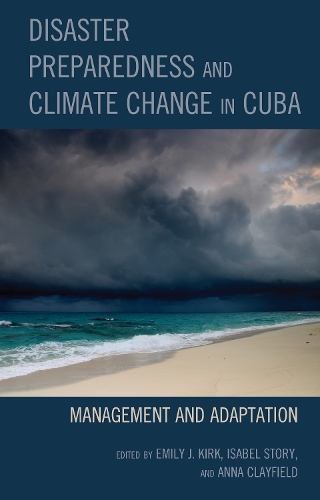
Disaster Preparedness and Climate Change in Cuba: Management and Adaptation
(Hardback)
Publishing Details
Disaster Preparedness and Climate Change in Cuba: Management and Adaptation
By (Author) Emily J. Kirk
Edited by Isabel Story
Edited by Anna Clayfield
Contributions by Leidy Casimiro Rodrguez
Contributions by Anna Clayfield
Contributions by Lauren Collins
Contributions by Margarita Fernndez
Contributions by Shawn Harmon
Contributions by Jessica Hirtle
Contributions by Emily J. Kirk
Bloomsbury Publishing PLC
Lexington Books
19th August 2021
United States
Classifications
Professional and Scholarly
Non Fiction
Natural disasters
Communication studies
363.34097291
Physical Properties
Hardback
258
Width 160mm, Height 228mm, Spine 29mm
630g
Description
As a result of climate change, ocean temperatures are warming and sea levels are rising. Natural disasters have been increasing in frequency and ferocity. Yet, over six decades, Cuba has developed a world-leading model for disaster preparedness and risk reduction. Disaster Preparedness and Climate Change in Cuba: Management and Adaptation discusses the islands ongoing resilience against the impacts of climate change. Its commitment to disaster preparedness and management are lauded by international bodies, such as the United Nations and World Health Organization, and by governments from across the globe. Comprised of research from leading scholars, policy makers, and activists, this comprehensive, multidisciplinary analysis of Cubas model explores why Cubas approach to emergency disaster response is such a success and the aspects that make it so distinct, while also informing readers about the much-needed improvement of international approaches and policies. Scholars of communication, environmental studies, and Latin American studies will find this book particularly interesting.
Reviews
"Cuba's uncanny ability to weather natural disasters with minimal loss of life is a continual source of wonderment to outside observers. An island in hurricane alley, Cuba recognized risks of climate change early and has developed the most detailed, long-term plan to confront it of any nation in the world. This collection by an international team of scholars is a deep dive into Cuba's relationship with its environment--disaster preparedness, the tension between development and conservation, and adaptation to climate change. Cuba's exceptional efforts to live in harmony with its environment is a subject that has not received the attention it deserves--a knowledge gap for which this book is an important remedy."
--William M. LeoGrande, American University"This timely study offers a highly complex and multi-disciplinary analysis of Cuba's outstanding ability to deal effectively with the twin - and closely-related - threats of natural disasters and climate change. It provides a wealth of perspectives on how Cuba has developed sustained policies to face these increasing threats; and it demonstrates through carefully-contextualised chapters how the Cuban response is based both on collaboration and on singular, often highly inventive, solutions to its own problems. It is a must for researchers of development and environmental studies and a host of other disciplines, and its interdisciplinary focus is a model for collaborative research."
--Par Kumaraswami, University of Nottingham, UKMuch of the world's youth worry that governments make only pretend gestures about climate change. Anyone sharing their concern might want to put aside whatever prejudices they have about Cuba and study the book Disaster Preparedness and Climate Change in Cuba. This collection of 14 essays may be the most profound untold story in print about an island nation struggling for survival against dangers already rising at its shores. The essays are an extraordinary assemblage of articles, with each author covering specific topics.
-- "New York Journal of Books"Author Bio
Emily J. Kirk is research fellow in the Department of International Development Studies and adjunct professor at Dalhousie University.
Isabel Story is senior lecturer in visual communications at Nottingham Trent University.
Anna Clayfield is a senior lecturer in Spanish and Latin American studies at the University of Chester, UK.
